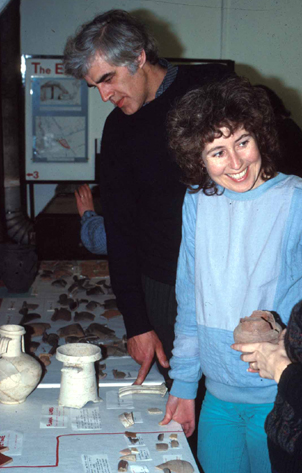|

Christopher St John Breen with Marion Green
at the D.D.A.G. Centre
|
|
The late
Christopher St John Breen (1943-1988) led members of Dartford
District Archaeological Group (D.D.A.G) in collecting sherds of
pottery from dumps of soil fly-tipped by lorries clearing the
former site of Billingsgate Lorry Park, London in 1984. A small
segment of the site had been the subject of an archaeological
excavation, but the rest was just machined out and loaded into
lorries. There seemed to be little control on the dumping of the
soil, and soon about twenty-nine lorry loads of soil were found
fly-tipped by a member of the D.D.A.G. on Dartford Heath. Chris
soon recognised the importance of collecting as much as possible
of the pottery. News of many more dumps of soil at the site of a
disused factory in Dagenham saw members of the Group travelling
there on a number of occasions to collect pottery.
Many thousands of
sherds of all dates, were collected and taken to the then D.D.A.G.
Research Centre, Lowfield Street, Dartford where they were washed
and sorted. This sorting exercise lead to pottery specialists from
the Department of Urban Archaeology at the Museum of London
travelling down to Dartford to view the collection. Really rare or
important pieces were taken away to London, but many of the
remaining individual sherds were identified and became the core of
the Pottery Archive formed by Christopher St John Breen.
Chris set up a system of plastic boxes, each holding
fifteen small trays measuring 2½ x 5¾ inches, that contained
examples of Roman and Medieval pottery sherds identified by the
visiting specialists. The K.A.S. Fieldwork Committee kindly made a
grant towards this work.
|